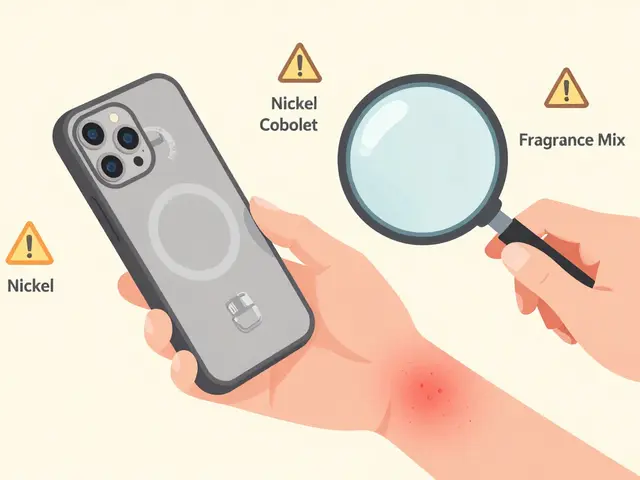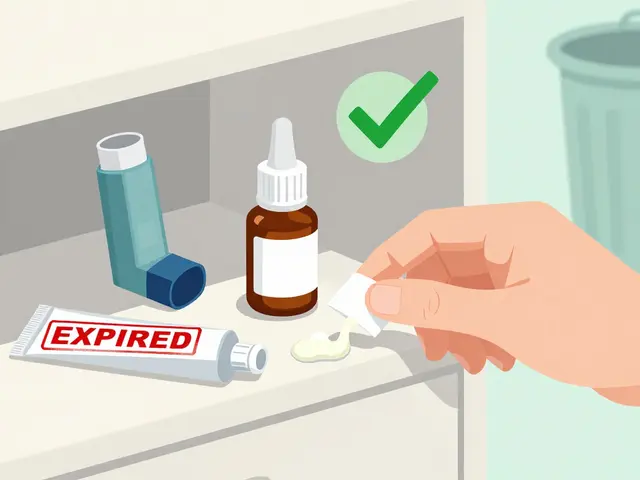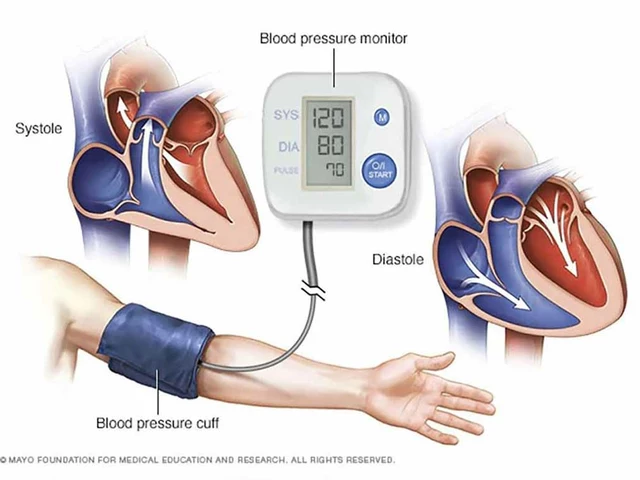Psoriasis, a chronic skin condition, does not discriminate by age. When it affects children, the challenges are magnified. Choosing the right treatment is crucial. One of the medications often under consideration is acitretin, which comes with its own set of pros and cons. This article will guide you through what acitretin does, its benefits, and potential risks, helping parents make informed decisions for their little ones.
- Understanding Psoriasis in Children
- How Acitretin Works
- Benefits of Acitretin for Children
- Potential Risks and Management
Understanding Psoriasis in Children
Psoriasis is not just an adult condition; it can affect children too. This chronic skin disorder leads to patches of red, scaly skin, which can be particularly tough for young ones to cope with. Unlike adults, kids may not fully understand why their skin looks different, leading to emotional and psychological challenges.
In children, psoriasis most often appears on the scalp, knees, elbows, and lower back. The triggers may be varied and can include infections like strep throat, skin injuries, stress, and even certain medications. Genetics play a significant role, and children with a family history of psoriasis are more likely to develop the condition. Unlike with adults, symptoms in children can sometimes be mistaken for other skin disorders, leading to delays in proper diagnosis and treatment.
One unique aspect of psoriasis in children is its impact on social interactions. Kids with visible patches may experience bullying or social isolation. This can lead to a lack of confidence and self-esteem issues. Moreover, the itching and discomfort associated with psoriasis can impact a child's sleep and daily activities, making it difficult for them to focus on their studies or enjoy playtime.
When it comes to treatment, doctors aim to balance efficacy with safety. Topical treatments are usually the first line of defense. These include corticosteroids, vitamin D analogues, and moisturizers. When these are not enough, systemic medications like acitretin come into play. However, the choice of treatment depends heavily on the severity of the condition, the child's age, and overall health. It's a delicate balancing act that requires careful monitoring by medical professionals.
According to the National Psoriasis Foundation, about 20,000 children younger than 10 years are diagnosed with psoriasis each year in the United States alone. Studies show that early intervention and appropriate treatment can significantly improve the quality of life for these young patients. Parents and caregivers need to be well informed and proactive in managing the condition to prevent flare-ups and complications.
"Managing psoriasis in children involves a holistic approach. It's not just about treating the skin but also addressing the emotional and psychological well-being of the child. Early diagnosis and a tailored treatment plan can make a huge difference." — Dr. Sarah Lio, Pediatric Dermatologist
Education is also crucial. Parents should educate their children about the condition in age-appropriate ways. Teaching kids that psoriasis is not contagious can help reduce the stigma they might face. Schools can also play a supportive role by fostering an inclusive environment for children with skin conditions.
Given these unique challenges, understanding and acknowledging the nuances of psoriasis in children is the first step towards effective management. With the right care, children with psoriasis can lead healthy and happy lives.

How Acitretin Works
Understanding how acitretin works can help parents and caregivers make informed decisions regarding their child's psoriasis treatment. Acitretin is a retinoid, which means it is a derivative of vitamin A. This medication helps control the speed at which skin cells grow and is particularly effective in treating severe psoriasis. By slowing down cell turnover, acitretin reduces scaling and thickening of the skin that is characteristic of psoriasis.
When children take acitretin, the medication works from within the body to bring about noticeable changes on the skin. It normalizes the growth cycle of skin cells. Usually, skin cells grow and shed over a month-long cycle, but in children with psoriasis, this process can take only days. Acitretin helps reset this cycle back to a more typical period, alleviating many of the frustrating symptoms.
Researchers have found that acitretin binds to specific nuclear receptors in the skin cells. These receptors then influence gene expression that controls cell differentiation and proliferation. This essentially means that the medication can change how the skin cells behave at a molecular level, promoting healthier skin formation.
Acitretin is often used when other treatments, such as topical creams and ointments, do not provide sufficient relief. It is especially useful for severe cases of psoriasis where the skin plaques cover a large area of the body or are resistant to other treatments. However, the medication does not provide an instant solution. It might take weeks or even months for the effects to become noticeable.
Doctors typically start children on a lower dose to see how their bodies respond before increasing it to the recommended levels. This step-by-step approach helps in minimizing potential side effects. Since acitretin is quite potent, regular follow-ups with a healthcare provider are essential to monitor progress and make necessary adjustments.
Dr. Emily Adams, a pediatric dermatologist, mentions, "Acitretin can be a game-changer for children with severe psoriasis, especially when topical treatments don’t work. But it’s crucial to weigh the benefits against the risks and to monitor the child’s health closely during treatment."
Acitretin does more than just tackle the cosmetic issues; it can also relieve some of the itching and discomfort associated with psoriasis, leading to a better overall quality of life. Yet, it’s essential for parents to be aware of the commitment required in terms of medication adherence and monitoring side effects.

Benefits of Acitretin for Children
When considering medication options for children with psoriasis, acitretin often stands out as a drug with tangible benefits. This medication, a retinoid derived from Vitamin A, has proven its effectiveness in managing severe psoriasis. For children struggling with this chronic condition, the need for such effective treatments can't be overstated. One of the primary benefits of acitretin is its ability to significantly reduce the scaling and redness associated with psoriasis lesions. Kids, often conscious of their appearance and prone to feeling self-conscious, may find relief both physically and emotionally when their skin starts to clear up.
Acitretin also helps to decelerate the rapid skin cell turnover which is characteristic of psoriasis. By doing this, the drug not only diminishes existing plaques but also prevents new ones from forming. This aspect of the medication can lead to long-term improvement, giving children the chance to enjoy extended periods of clearer skin. This can be particularly beneficial during critical years of social and emotional development.
Moreover, acitretin is known for its versatility and can be used in combination with other treatments. In some cases, topical treatments or other systemic medications may not be enough, and acitretin can be added to the regimen to enhance the overall effectiveness. This combinatorial approach can help achieve better control over the symptoms, vastly improving the quality of life for young patients. It's also worth mentioning that, compared to some systemic treatments, acitretin doesn't suppress the immune system, which can be a crucial consideration for growing children.
Given the chronic nature of psoriasis, long-term safety and efficacy are vital. Compared to some other systemic therapies, acitretin has a longer track record and more extensive data supporting its use. This includes evidence from both clinical trials and real-world use. In fact, Dr. Cindy Chemali, a renowned dermatologist, notes that, "Long-term studies indicate that acitretin can maintain its efficacy for several years, which is reassuring for parents considering this as a treatment option for their children."
Another benefit linked to acitretin is its oral administration. Unlike more invasive treatments such as injections or phototherapy sessions, taking a pill is generally easier for children and less disruptive to their daily routines. This ease of administration enhances adherence to the treatment plan, which is crucial for achieving the desired results. Yet, it's essential for parents to follow the pediatrician's advice closely to mitigate potential side effects.
The convenience of acitretin as an oral medication, coupled with its efficacy, makes it a compelling option for treating severe psoriasis in children. Moreover, by addressing both the visible symptoms and underlying causes of psoriasis, the drug offers a comprehensive solution that can improve a child's overall well-being. While every treatment comes with its risks, the potential benefits of acitretin are significant and can make a profound difference in the lives of youngsters battling this challenging condition.

Potential Risks and Management
As with any medication, acitretin comes with potential risks that parents need to consider. One of the major concerns is its possible side effects, which can range from minor to severe. Common side effects include dry skin, chapped lips, and hair loss. These are manageable with proper skincare routines, such as using heavy moisturizers and lip balms, but require vigilance to ensure the child remains comfortable.
More serious risks include liver damage and elevated blood lipid levels. Regular monitoring through blood tests is crucial for early detection and management of these issues. Parents should work closely with their child’s healthcare provider to schedule these tests periodically. If any abnormalities are noticed, dosage adjustments or discontinuing the medication might be necessary.
Another significant risk is related to bone health. Acitretin has been associated with changes in bone growth, which is particularly concerning for children who are still developing. This requires a careful balance between the medication’s benefits and its impact on the child’s growth. Pediatricians may request regular bone density scans to monitor any changes over time.
Sun sensitivity is another factor to be aware of. Children on acitretin may become more prone to sunburns, making sun protection incredibly important. Applying sunscreen, wearing protective clothing, and minimizing sun exposure during peak hours can help mitigate this risk. Parents should educate both themselves and their children about the importance of these precautions.
When it comes to mental health, acitretin has been reported to cause mood changes and depression in some cases. Although rare, it’s vital for parents to keep an eye on their child’s emotional well-being. Open communication and regular check-ins can help identify any mood shifts early, allowing for prompt intervention if needed. Counseling and support groups can be beneficial for both the child and the family in managing the emotional aspects of chronic illness.
Given these potential risks, informed decision-making is essential. Acitretin can be a valuable tool in managing severe psoriasis, but it’s not a one-size-fits-all solution. Parents should weigh the pros and cons, considering their child’s unique situation. Consulting with healthcare providers who specialize in pediatric dermatology can provide valuable insights. As John Smith, a renowned dermatologist, once said,
“An informed approach, with close monitoring, can make all the difference in successfully managing chronic conditions like psoriasis.”
It's important to adopt practical strategies to manage these risks effectively. Being aware, staying informed, and maintaining open channels of communication with medical professionals can empower parents to provide the best care for their child. Ultimately, the goal is to improve the child’s quality of life while minimizing any adverse effects, ensuring they can lead a healthy and happy life despite their condition.







Ryan Wilson June 21, 2024
We all love a good miracle drug, but when it comes to kids, we have to ask ourselves if the price of clarity is worth the hidden toll on a growing body. The article does a solid job outlining the basics, but I keep hearing parents downplay the liver monitoring. Skipping those routine blood draws feels like an ethical shortcut. Remember, a child's skin isn’t the only thing that needs protection – their whole system does. If you’re considering acitretin, make sure the pediatric dermatologist is on board for the long haul.
EDDY RODRIGUEZ July 2, 2024
Wow, this piece really hits home! 🎉 For any parent watching their child struggle with those stubborn plaques, know that you’re not alone. The benefits of acitretin can be a game‑changer, especially when topical treatments have hit a wall. I’ve seen kids go from constant itching to actually enjoying sleep again – that’s priceless. Just remember to stay on top of the labs and keep the conversation open with the dermatologist. Your vigilance today means smoother days tomorrow! 🌟
Christopher Pichler July 12, 2024
Interesting read, but let’s unpack the jargon a bit. The drug’s mechanism involves retinoid receptors modulating keratinocyte differentiation – essentially re‑programming the skin’s overactive transcriptional cascade. While the article mentions “monitoring” in passing, it glosses over the pharmacokinetic nuances that can affect pediatric dosing. Sarcasm aside, I’d advise clinicians to run baseline lipid panels, not just the liver enzymes. A data‑driven approach ensures we’re not trading one side effect for another.
VARUN ELATTUVALAPPIL July 23, 2024
Hey!! Look, I get the excitement, but!!! The dosage tweaks aren’t just "start low and go higher" – you need to calibrate based on weight, age, and even seasonal vitamin A intake, right? And those blood tests? They aren’t optional – they’re mandatory, period!!! If you skip them, you’re basically playing roulette with the kid’s liver and bones.
April Conley August 2, 2024
Parents should absolutely prioritize sun protection when using acitretin.
Sophie Rabey August 13, 2024
Honestly, the biggest win here is the oral route – kids hate the hassle of creams and gels. A pill is way easier to fit into a morning routine, especially when you’ve got school schedules to juggle. Still, keep an eye on those lip‑drying side effects; a good balm can make a world of difference. And if the cholesterol spikes, a quick diet tweak usually does the trick. Bottom line: with the right support, acitretin can be a solid piece of the puzzle.
Bruce Heintz August 23, 2024
Great points all around! 😊 I’d add that setting a weekly reminder for blood work can keep the whole family on track. It also gives a chance to celebrate small victories – like a week without flaking skin. Keep the communication lines open, and don’t hesitate to ask the doctor about any mood changes you notice.
richard king September 3, 2024
When we peer beyond the glossy headlines, the story of acitretin unfolds like an ancient epic, each chapter laced with paradox. First, the drug silences the rampant proliferation of keratinocytes, coaxing them back into the rhythm of a healthy epidermis – a triumph of chemistry over chaos. Yet, the same retinoid that restores calm can also whisper insidious warnings to the liver, reminding us that the organ’s detoxifying chorus is not invincible. The practitioner, then, becomes a steward of balance, a tightrope walker between relief and risk.
Consider the premature adolescent whose bones are still drafting their final architectural plans. Acitretin, in its zealous quest to normalize skin turnover, may meddle with the osteoblastic symphony, nudging growth plates into subtle discord. A vigilant guardian will request periodic densitometry, lest the child’s stature be betrayed by a silent, skeletal compromise.
Coupled with this, the drug’s propensity to unleash dryness upon the skin and lips is more than a cosmetic nuisance; it is a barrier breach that can invite infection, a reminder that the skin’s protective veil is an active participant in health. Moisturizers, lip balms, and diligent hydration become allies in this therapeutic odyssey.
And then there is the shadow of mood – the melancholic undercurrent that drifts through the retinoid’s influence on neurochemical pathways. While rare, these tremors of depression demand an ear attuned to emotional nuance, for a child’s smile can mask an inner turbulence. Regular dialogues, perhaps a therapist’s counsel, become as essential as any laboratory panel.
In essence, acitretin is not a simple potion but a complex narrative, demanding that each caregiver read between the lines, weigh each benefit against each whisper of danger, and chart a course marked by compassion, vigilance, and informed optimism.
Dalton Hackett September 13, 2024
From a grammatical standpoint, the article maintains a consistent tense, which aids readability, though a few comma splices slip through the editorial net; for instance, “It might take weeks or even months for the effects to become noticeable” could be paired with a coordinating conjunction for smoother flow, and the phrase “regular follow-ups with a healthcare provider are essential” would benefit from a preceding clause to avoid a fragment. These minor corrections, while not detracting from the core message, exemplify the importance of meticulous proofreading, especially in medical literature where precision is paramount.
William Lawrence September 24, 2024
Sure, acitretin works okay but who needs another drug when you can just let the kids suffer in silence.
Grace Shaw October 5, 2024
It is incumbent upon the caregiver to approach the administration of acitretin with a solemn sense of responsibility, acknowledging both the therapeutic advantages and the potential iatrogenic sequelae. The literature underscores the necessity for periodic hepatic function assessments, encompassing alanine aminotransferase and aspartate aminotransferase evaluations, at intervals not exceeding three months during the initial phase of therapy. Concurrently, a lipid profile should be obtained to preemptively identify dyslipidemia, which may necessitate dietary modification or pharmacologic intervention. Moreover, vigilance regarding skeletal development is warranted; radiographic bone age determinations may be employed should growth arrest be suspected.
In sum, a multidisciplinary approach, integrating dermatology, pediatrics, and, where appropriate, nutrition and psychology, furnishes the optimal framework for safely harnessing the benefits of acitretin while mitigating its inherent risks.
Sean Powell October 15, 2024
Take care of the kid, no drama, just meds and check ups
Henry Clay October 26, 2024
Don't forget the blood tests, they matter 😊
Isha Khullar November 5, 2024
Acitretin can be a blessing or a curse, choose wisely.